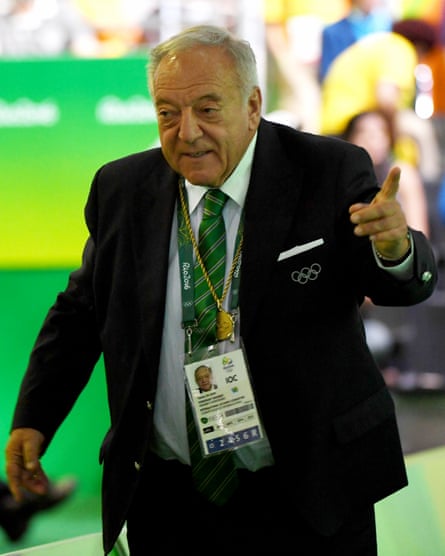In all the excitement it was easy to miss the press release put out by the International Olympic Committee on 6 August announcing a tweak to rule 59 1.2b of the Olympic charter. But in one little corner of the Games hundreds of athletes and officials were hanging on the change. The rule now states that the IOC’s executive board has the power to “suspend any sport, discipline or event” if the federation running it acts “in a manner likely to tarnish the Olympic movement”. Which, for those in the know, was a clear and unequivocal threat to the International Weightlifting Federation: clean up or be kicked out of the Olympics.
The board had the first opportunity to use its new power on Wednesday, for its review of the Tokyo Games. The IWF has just held a conference too, in Doha last week, where its members voted to adopt a bold new constitution. They hope that they have done just enough to earn a stay from the IOC. “I’m not sure we’ll get confirmed on the Paris 2024 programme,” says Phil Andrews, chief executive of USA Weightlifting, “but I do think we made enough progress in Doha that the IOC will give us a chance.”
The lifters love to say that without them the old Olympic motto “Faster, Higher, Stronger” would be meaningless. Weightlifting has been on the programme since 1896 and has provided plenty of iconic Olympic moments in the years since. There were a handful more in Tokyo this summer, where Hidilyn Diaz won the Philippines’ very first Olympic gold medal, Polina Guryeva Turkmenistan’s first of any colour and Emily Campbell Great Britain’s first in women’s weightlifting.
But this is not a story about what happens during the fortnight of the Games, when everyone is paying attention. It is a story about what happens during the other 206 weeks of the Olympic cycle, when hardly anyone is. Weightlifting, like so many Olympic sports, is in the shady spot where there is plenty of money sloshing around but precious little mainstream scrutiny of how it is being spent. And in that, too, it is emblematic of a certain type of Olympism and a set of values not found being trumpeted anywhere on the IOC’s website but which run through the history of Olympic movement.
You can find out all about them in the McLaren report, which was published last June. The report was commissioned after a group of journalists working for the German TV network ARD decided to take a close look at what was going on at the IWF, and in particular at Tamas Ajan, who ruled the federation for 45 years, first as general secretary, then as president. It is a startling read, even for a hardened cynic. It lays bare the grubby way the sport was run, the hidden bank accounts, the phony audits, the cash bribes, the embezzlement, the cover-ups, the threats and bullying, the nepotism and cronyism.

McLaren describes it as “rule by fear, deception and corruption”. A montage of its stand-out moments might include the one when the investigators looking for a missing $10m crack open the safe in which the IWF stashed its cash only to find it has already been emptied, or the witness testimony about the camera flashes going off in the polling booths during the federation’s elections as officials took photos of their ballots to prove they had earned their bribes, or the accounts of people queuing up outside a hotel room for cash handouts from Ajan’s bagman.
At the heart of it all was the sport’s doping problem. More than 600 lifters have tested positive in the last decade. There have been Olympics events where all three medal winners have later been caught, banned and had their medals taken away. Plenty of those who were caught paid fines to Ajan in cash, in person. There were cases where he helped national federations who supported him to cover up tests, and others where he threatened national federations who opposed him with false positives.
Much as the IOC might like to make this all out to be the IWF’s problem, it is not. Ajan, the man behind all of this, was an honorary member of the IOC itself (he resigned when this scandal broke), a founding member of the World Anti-Doping Agency and until 2018 was on its foundation board. The man spent almost half a century at the heart of the Olympic movement.
In the months since Ajan resigned the IWF has been split in a fight between the reformers and the reactionaries, many of them named in the McLaren report as Ajan’s cronies. The anti-doping programme has already been overhauled and the new constitution is another victory for the reformers, such as Andrews and Sarah Davies, the British lifter who is chair of the IWF’s athletes’ commission. She describes it as “a leap forward”. In many ways the IWF now has a more progressive constitution than many other sports. Its executive meetings will be livestreamed; the athletes themselves will have three representatives on the board; and officials representing the countries with the worst doping records will be blackballed.
The new constitution carries the possibility of something better, then, of what Davies calls “a new chapter” in the sport, “one with a hope of transparent governance, clean sport and athlete representation”. And with that it carries, too, an implicit condemnation of the way so much Olympic business has been run for so long. As Andrews says “without naming names, there are definitely some sports which are as badly run, or even less well run, but ultimately they’re not the ones facing elimination from the Games. We are.”

